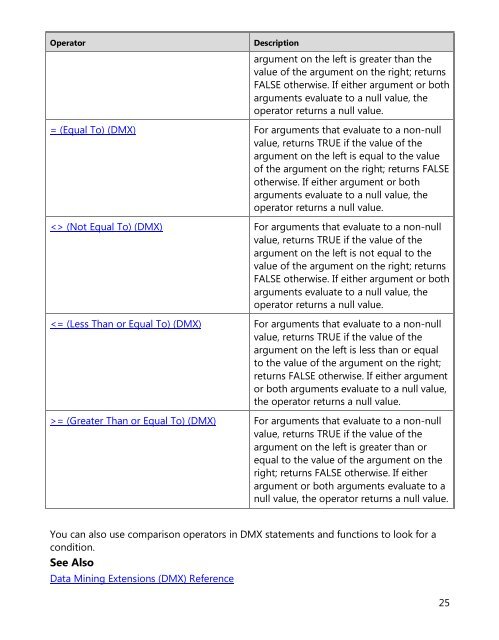Data Mining Extensions - DMX - Reference
You also want an ePaper? Increase the reach of your titles
YUMPU automatically turns print PDFs into web optimized ePapers that Google loves.
Operator<br />
Description<br />
argument on the left is greater than the<br />
value of the argument on the right; returns<br />
FALSE otherwise. If either argument or both<br />
arguments evaluate to a null value, the<br />
operator returns a null value.<br />
= (Equal To) (<strong>DMX</strong>) For arguments that evaluate to a non-null<br />
value, returns TRUE if the value of the<br />
argument on the left is equal to the value<br />
of the argument on the right; returns FALSE<br />
otherwise. If either argument or both<br />
arguments evaluate to a null value, the<br />
operator returns a null value.<br />
(Not Equal To) (<strong>DMX</strong>) For arguments that evaluate to a non-null<br />
value, returns TRUE if the value of the<br />
argument on the left is not equal to the<br />
value of the argument on the right; returns<br />
FALSE otherwise. If either argument or both<br />
arguments evaluate to a null value, the<br />
operator returns a null value.<br />
= (Greater Than or Equal To) (<strong>DMX</strong>) For arguments that evaluate to a non-null<br />
value, returns TRUE if the value of the<br />
argument on the left is greater than or<br />
equal to the value of the argument on the<br />
right; returns FALSE otherwise. If either<br />
argument or both arguments evaluate to a<br />
null value, the operator returns a null value.<br />
You can also use comparison operators in <strong>DMX</strong> statements and functions to look for a<br />
condition.<br />
See Also<br />
<strong>Data</strong> <strong>Mining</strong> <strong>Extensions</strong> (<strong>DMX</strong>) <strong>Reference</strong><br />
25









